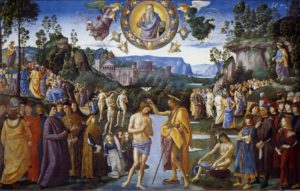 The Feast of the Baptism of the Lord: January 9, 2022
The Feast of the Baptism of the Lord: January 9, 2022
Masses at St. Julia to celebrate the Feast of the Baptism of the Lord:
Saturday, January 8th at 4:00 pm
Sunday, January 9th at 8:00 am, 9:30 am, 11:30 am & 5:00 pm
Unable to attend church? Watch the Mass livestreamed or a recording on our Homepage.
Reflection
God reveals two important mysteries at Jesus’ baptism in the Jordan River. The first is an eternal mystery, while the second is bound up with the course of salvation history.
The first mystery revealed at the Baptism of the Lord Jesus is the Most Holy Trinity. This mystery is not spoken of often in the Gospel accounts, so consider each of the three divine Persons of the Most Holy Trinity in the light of the Lord’s baptism.
Concerning God the Holy Spirit, it’s notable that the Holy Spirit descends in the form of a dove. The dove calls to mind Noah and the Ark. After forty days of the Flood, a dove descended to reveal to Noah that dry land had been found and God’s destruction ended.
In the account of the Baptism of Jesus, the order of events is reversed: Jesus ascends from the water, the dove descends, and then—the next passage in the Gospel according to Mark tells us—Jesus spends forty days in a desert to start His work of restoring life.
In the Flood, God destroyed corrupt human beings to destroy sin. But in the Gospel, Jesus is destroyed by corrupt human beings in order to destroy sin. The former effort failed, while the latter—thanks be to God—has truly won for us God’s victory over sin.
Concerning Jesus, it’s revealed at His Baptism that He is the Son of God. The Church proclaims this truth throughout the Christmas Season, of course. But Jesus is baptized when He is thirty years old. Very likely, the events surrounding the birth of Jesus had been forgotten by many at that point. Yet the Baptism of Jesus was the start of His public ministry. It was important at this point that God the Father would declare Jesus to be His own Beloved Son.
However, today’s feast reveals a second mystery in addition to the mystery of the Trinity’s inner life. Today’s feast of the Baptism of Jesus reveals that you yourself are called to be a child of God by means of sharing in the life and death of Jesus Christ.
Jesus, of course, had no need to be baptized.
He was baptized for the same reason that He became human; for the same reason that He taught and worked miracles; for the same reason that He was crucified, died, and was buried: for us.
Likewise, Jesus was baptized for us. He was baptized to show us the way, because baptism is the way into the life of Jesus, and through Him into the inner life of the Trinity.
Your baptism was the moment when you became one member of Christ’s Body. Your baptism was the moment when Christ’s life became the meaning and goal of your life. Your baptism was the moment when God the Father adopted you as His own child.
Your relationship with God the Father—as one of His very dear children [see Ephesians 5:1)—is the heart of your life as a Christian.
Concerning, finally, the divine Father who adopts sinners through baptism, there are pitfalls that we have to be wary of. First, God as a Father is a father in His own way, not as we might wish. In other words, God is not Santa Claus, who gives us what we want. God is our divine and providential Father who gives us what we need.
Second, God the Father does not remove every obstacle from our path. Some obstacles He does remove for us, out of love. But out of love, some obstacles He does not remove, instead showing us how to resolve them ourselves, and demanding that we take responsibility for that which is in our power.
Third, God the Father doesn’t keep us at a remove. He wants us to become like Himself in all things. He wants us to become like Him even in offering sacrifice. Santa Claus never asks us to give up things, or to sacrifice our very selves.
God the Father does ask that of us, because that’s what He Himself did for us in sacrificing His Son Jesus for our sins. Sacrifice is not the sum total of our relationship with God the Father. But it is the highest measure of whether each of us becomes like Him, which means: whether each of us becomes as loving as He is.
— Fr. Thomas Hoisington (Catholic Diocese of Wichita)
